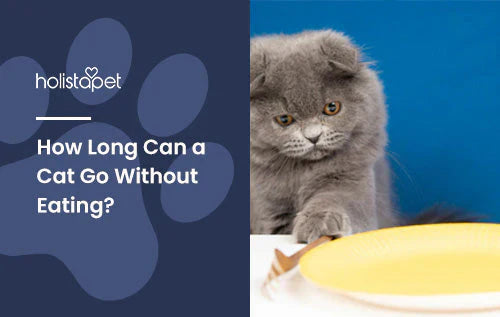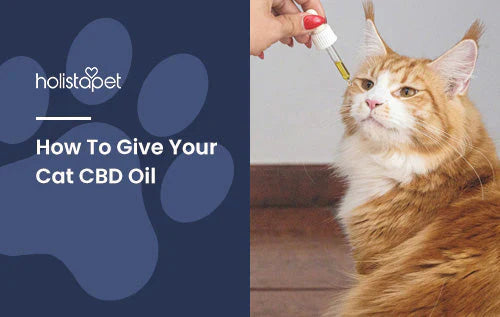Is your cat's food bowl not empty at the end of the day? Does it seem like your cat is refusing to touch their food? Cats are known to be very picky about food, but not eating can be a very alarming health concern. So how long can a cat go without eating before you need to address the issue?
Cats can go without food for a week, but you must immediately call a vet if your cat goes over a day without eating. This can be a sign of serious health problems or lead to fatal health complications if not addressed.
Whether it's simply your cat being picky or a possible health issue, a cat not eating is something that requires an immediate vet visit. But meanwhile, you can try to figure out what's going on and provide some comfort for your kitty. Let's take a closer look at what may be going on with your cat when they decide to stop eating.
Why Is It Important for a Cat to Eat?
Just like us, cats need nutrients to live. Nutrients come from food and water. If your cat doesn't get the nutrients they need, they can face a lot of health complications and other negative side effects.
Weight Loss: Without food, your cat will lose weight. If they become underweight, it's considered a medical emergency.
Fatty Liver Syndrome: Hepatic Lipidosis is a common disease that develops in cats when they don't eat for days on end. You'll notice that your cat's eyes become yellow. At this point, the disease can become fatal. You should always have your cat checked for fatty liver syndrome.
Exhaustion: Cats that don't get enough nutrients will become exhausted and lethargic. Exhausted cats will sleep a lot and not play. They won't be active. This lack of exercise and inability to move will lead to your cat becoming very sick.
Dehydration: A cat that doesn't eat enough food or drink enough water will become dehydrated. You'll notice your cat vomiting a lot or having diarrhea. This is considered a medical emergency and you will need to bring your cat to the vet immediately to avoid health complications.
Why Do Cats Avoid Eating?
There are a lot of reasons why your cat might be avoiding food. It's important to pinpoint why your cat isn't eating, so you can find a solution faster. It's a very serious issue if your cat is refusing to eat and you will most likely need to take them to the vet as soon as you notice this problem.
Illness
A lot of serious illnesses will make your cat lose their appetite. This could be due to some of the negative side effects they are feeling, like queasiness and nausea. It could also be from a feeling of lethargy, making your cat disinterested in food. Some illnesses will also make your cat too weak or in pain to even bother considering their food.
Stress
Cats are very finicky eaters. If they are feeling anxious or upset, they might avoid eating. Cats can become stressed when they are going through a major change, whether that's as simple as a different feeding schedule, a new home, or a big move. If your cat seems anxious and overwhelmed, give them time to calm down and get used to their new routine.
Dental Issues
Cats can develop dental problems just like humans if we don't keep on top of dental care. It's recommended that you brush your cat's teeth every day or give them dental treats to avoid gum problems and rotting teeth. If you don't keep on top of your cat's dental care, your cat could be experiencing a lot of pain in its mouth. They can feel even more pain when they try to eat, which may lead them to avoid their food.
Change of Food
A lot of cats don't like when you change their food. The sudden change or the new flavor might bother them, causing them to avoid their bowls during mealtime. It's important to slowly change your cat's food if needed, blending the old and new food together before switching over completely.
It's very common for cats to upturn their nose at healthier or fancier food since it contains fewer carbohydrates than their previous food. This is sort of like trying to make a kid switch from eating sugary cereal to a bowl of fruit. They will accept it over time, but the transition should be gradual.

How Long Can a Cat Go Without Eating?
A cat can survive around a week (sometimes two) without eating and only three days without water. But you should never let your cat go this long without eating! If you notice that your cat hasn't eaten in a day or two, contact your veterinarian immediately.
It's important that your cat gets the nutrition they need to be healthy, active, and happy. You should never let them go without eating for more than a few days, even if you believe it's just a matter of pickiness.
How Can I Get My Cat to Eat?
When your cat isn't eating, it's very important to schedule a veterinarian appointment. Your vet will be able to determine the possible reasons your cat is refusing to eat and also provide a solution for you to implement right away. But there are some things you can do meanwhile as you wait for your appointment.
Here are some things to do when you want to get your cat to eat.
Gradually Change Foods
If you switched to a new brand of cat food that's healthier or targets an important change (like your cat's age or illness) just know you did the right thing. Don't panic. But you may need to be a bit more gradual in your approach.
This means mixing your cat's old food brand with the new food so they won't get an upset stomach or refuse to eat the food. Each meal, slowly reduce the amount of old food you are mixing in so your cat is eventually just eating the new food.
Play With Your Cat
Cats love routine and it can help them become more accustomed to any changes you've made to their feeding schedule or environment.
Try playing with your cat for 30 minutes before each meal. This will create a routine with your cat that also gets them moving and active. Your cat will be more likely to eat after chasing a toy down the hall and flipping for ribbons.
Related: Cat Exercise: Different Ways to Play With Your Cat

Provide Them with CBD
CBD is a non-psychoactive found in hemp that won't get your cat high. This naturally occurring compound provides a lot of health and wellness benefits for your cat by interacting with their endocannabinoid system (ECS).
CBD will have a positive impact on your cat's physical and mental health, including reducing feelings of stress and discomfort.
Reducing your cat's stress will help them feel calm enough to eat their meals. And reducing physical discomfort can encourage your cat to eat again as well. CBD can also fight off feelings of nausea and other stomach discomforts. That's why CBD is known to regulate a cat's appetite.
Give your cat CBD oil by mouth if they are refusing to eat CBD cat treats. You may notice your cat returning to its usual appetite and mood after regularly providing them with CBD. This will often be giving them the right dose of CBD every eight hours.
CBD Dose Chart
When you start giving your cat CBD, provide them with CBD from our 150 mg CBD oil bottle. Give your cat 2.5 mg of CBD if they are between 1 and 20 pounds. This is a good starting amount you can give your cat every eight hours.
If your cat is already used to regularly taking CBD, you can provide them with a normal dose instead. Give them 5 mg of CBD oil every eight hours for a regular dose and 10 mg of CBD oil every eight hours for a strong dose.
A stronger dose is good for cats that have more visible physical discomfort or negative side effects of an illness.
Give Them Wet Food
If you are worried about your cat while you wait for the vet appointment, try providing them with wet food. This can often get them excited, especially if they aren't used to having canned food. Just remember to not give them a lot of wet food at once if they haven't eaten in a while to avoid them getting sick.
Related: Wet Vs Dry Cat Food - Why It Matters & What to Look For
Feed Them By Hand
You shouldn't get your cat in the habit of getting hand-fed. But if your cat is truly refusing to eat, you can try bringing some food to wherever they are resting. This can ensure they get a bit of food while you wait to find out what's troubling them at the vet office.

When Should I Go to the Vet?
Your cat will survive without food for a few days. But if you notice your cat not eating for more than a day, you need to contact a vet for an emergency appointment. Cats that don't eat for three days or more will face a lot of health complications, some of which are fatal.
Final Thoughts - How Long Can a Cat Go Without Eating?
Cats may be picky eaters, but it can be alarming when they stop eating completely. If you notice that your cat has stopped eating for more than a day, contact the vet immediately. A cat that's not eating can develop fatal health complications. There might also be a very important reason that your cat is refusing to eat, like an underlying illness.
Meanwhile, you can provide some comfort to your kitty by figuring out the source of the issue. Sometimes cats are just picky and hate their new food. Other times, cats are experiencing a lot of pain or discomfort.
Once you figure out what's going on with your cat, you can try to give them some comfort while you await the upcoming vet visit. This includes hand-feeding your cat, giving them CBD oil, and making sure you don't break too many routines. Your cat will appreciate the extra effort. You can also take a look at these resources for more care tips for our feline friends.
Read Next: IS IT CRUEL TO KEEP A CAT INDOORS OR ARE THEY BETTER OFF OUTSIDE?







![Probiotics For Dogs [Soft Chews] - HolistaPet](http://www.holistapet.com/cdn/shop/files/Probiotic-Infographic-1_472d7a29-e30c-435a-9638-1365d8c3a9f9.jpg?v=1725384841&width=104)



























Leave a comment
All comments are moderated before being published.
This site is protected by hCaptcha and the hCaptcha Privacy Policy and Terms of Service apply.